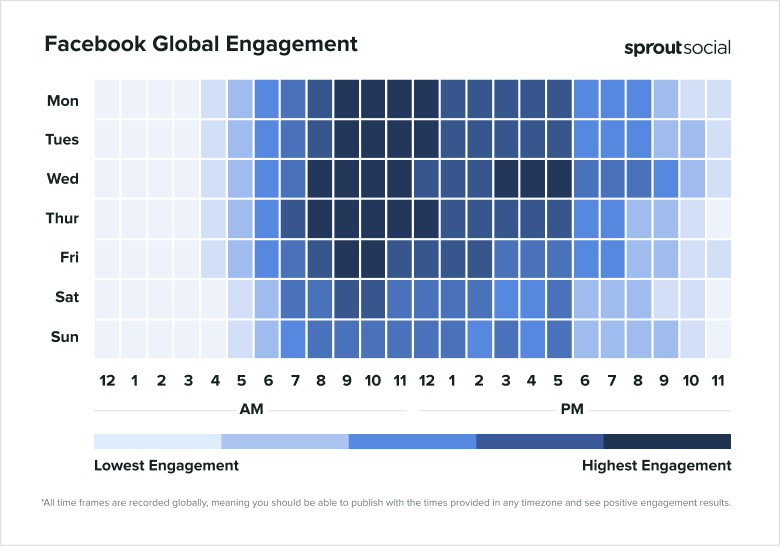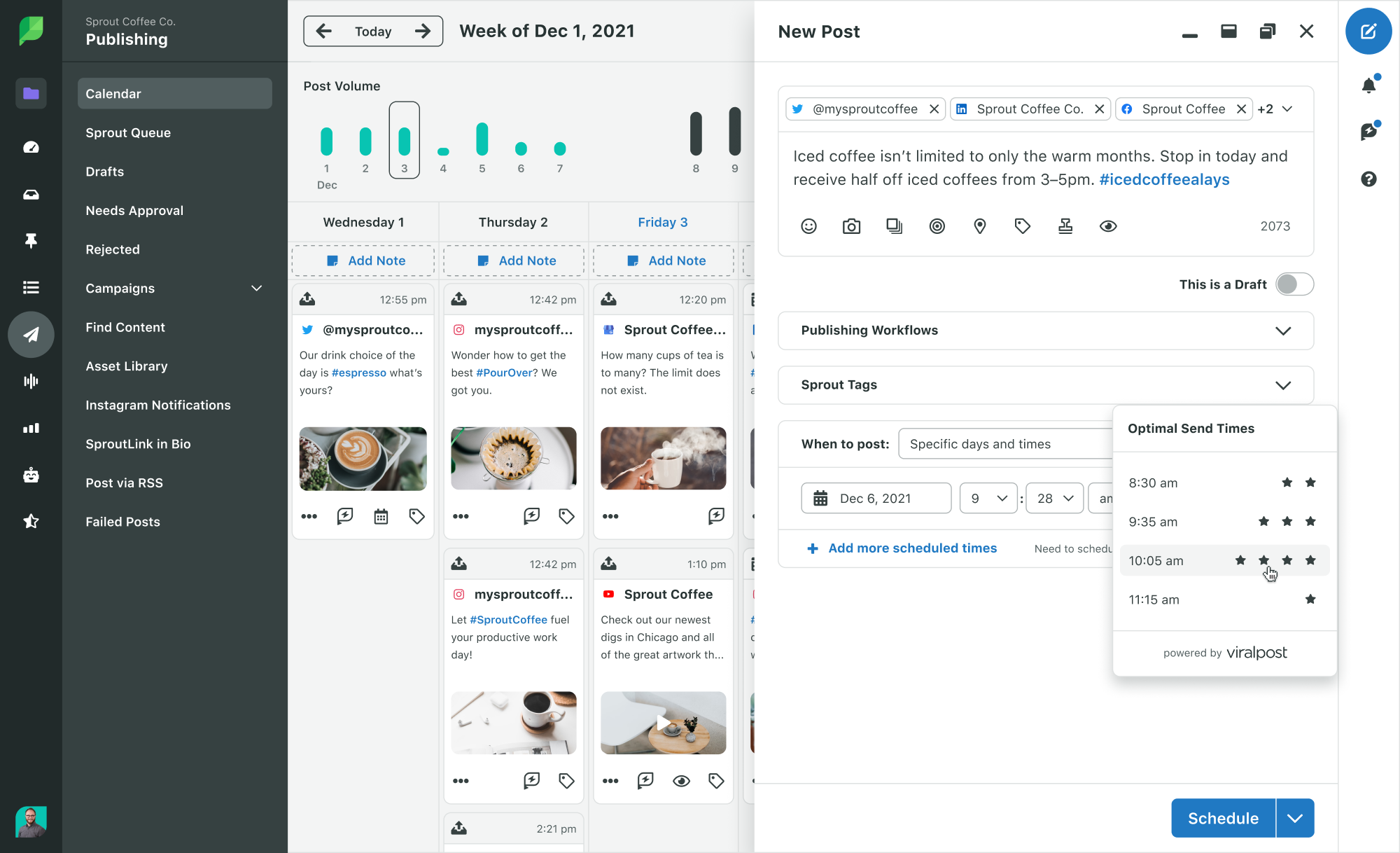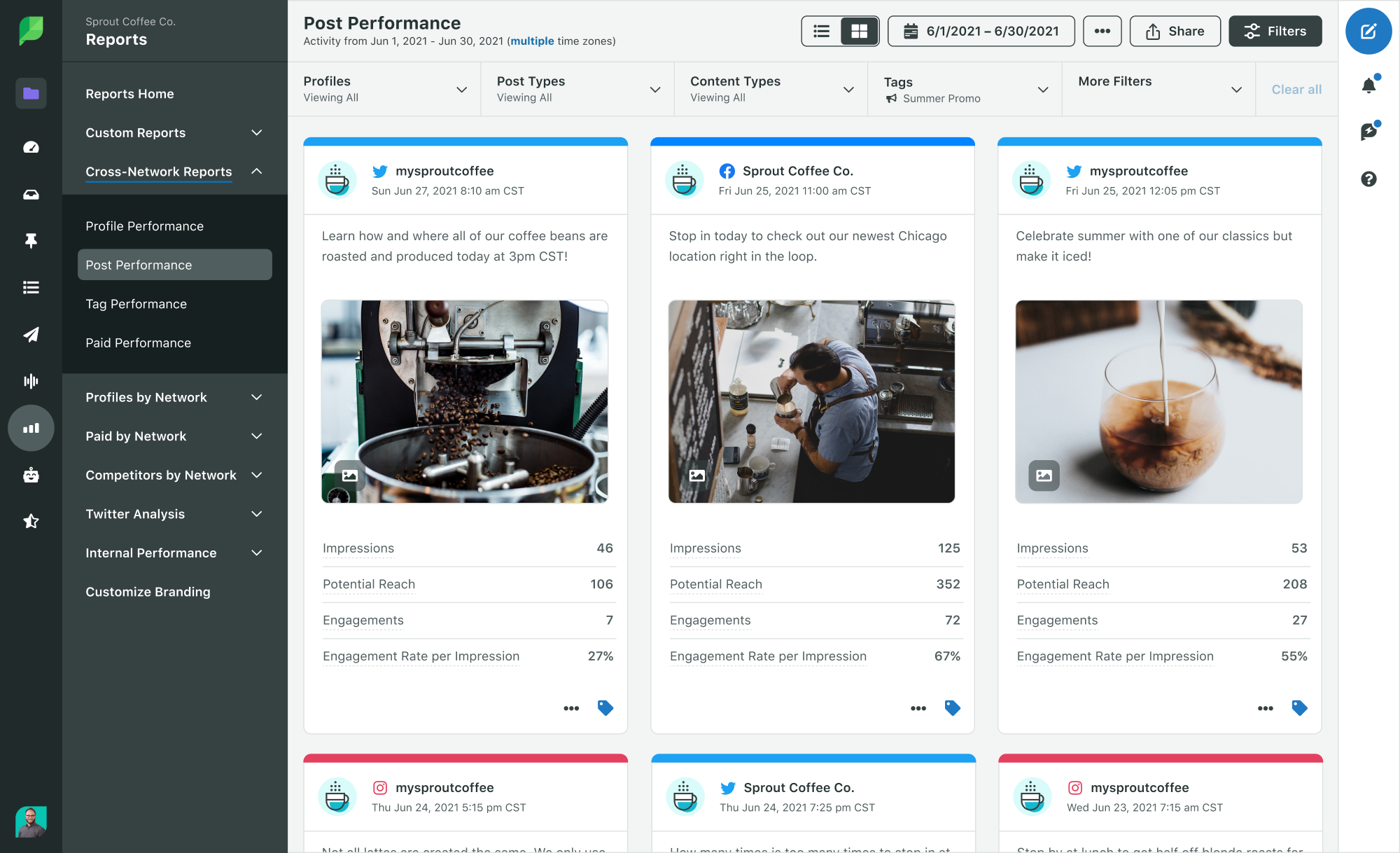13 Strategies to increase Facebook engagement

Table of Contents
One of the main components of any social media strategy is increasing your overall social media engagement—and the same goes for Facebook. If you’re promoting your business and its products or services on Facebook, you want your target audience to engage with your content.
However, increasing your Facebook engagement can be tricky. You need to know the right strategies to implement and how to get started.
Throughout this article, learn more about what Facebook engagement means, how to calculate your Facebook engagement rate and 13 key strategies for improving engagement on Facebook.
What is Facebook engagement?
Facebook engagement refers to any action that a Facebook user takes on your Facebook page—mainly likes, comments, shares and clicks. Increasing the number of engagements you see like this on your page proves that your Facebook marketing strategy is working and that your content resonates well with your audience.
How to calculate your Facebook engagement rate
You can calculate your Facebook engagement rate with a simple formula:
Facebook Engagement Rate = [(Total Likes + Comments + Shares)/Total Reach] x 100
You can find these metrics via Facebook insights or by using a third-party Facebook analytics tool. In your Facebook page dashboard, you can get a quick overview and grab your numbers from the “Post reach” and “Interactions” sections in order to discover your Facebook engagement rate.

The median Facebook engagement rate is 0.063%. While this engagement rate seems low, if you implement the 13 strategies below, your brand will be more likely to surpass that average.
13 strategies for improving Facebook engagement
Increase your organic reach with these 13 strategies—though don’t forget the power of Facebook ads in the meantime. These 13 organic reach tactics mixed with an ads strategy can ensure your business is reaching the people it needs to on Facebook.
1. Understand your target audience
Knowing who you’re trying to target with your content can help better inform your strategy, direct your messaging and ensure your content resonates with those your business can help the most.
Start by getting a basic understanding of social media user demographics so you know who is on each platform you market on. For example, we can see that Facebook’s basic demographics look like this:

Make sure this lines up with your business’s basic demographics. But then look even further. Who does your business help with its products or services?
For example, if you’re trying to reach men in their 30s, you should:
- Make sure they’re on your platform of choice (in this case, you’re in the clear)
- Create a strategy that caters to that audience
- Keep them in mind when you’re writing your content
2. Know the best times to post on Facebook
The more engagement a post receives, the more likely Facebook’s algorithm is to reward it with reach. This might seem a bit backward but it speaks to the importance of timing your posts to perfection.
By posting when your followers are most active, you instantly increase the likelihood of getting likes and comments.
And yes, there are data-driven best times to post on social media which can clue you in on what your posting calendar should look like.
The key here is to not just post at random and expect engagement. With the help of the chart below and analyzing your past post engagement, you can zero in on a schedule that makes sense.

We recommend using a Facebook scheduling tool to plan your social media calendar days or weeks in advance. It’ll keep you from forgetting to post and give you the flexibility to test different posting times.
Plus, by taking advantage of Sprout Social, you can discover optimal times for your specific brand to publish, rather than relying on global data. Just simply use the “Optimal Send Times” dropdown to see when Sprout’s AI recommends you share your posts.

3. Post consistently
While the next post talking about quality is just as important, you also need to post consistently. While global data showcases that some brands post around 4-5 times per day on Facebook, that’s a lot of content to share and also remain consistent.
What you need to do is figure out how many times your team can reasonably post each day or each week—and do so consistently. Consistent content creation increases your likelihood of appeasing the algorithm and getting your content seen by more people.
If you’re posting on a consistent and reliable basis, you’re on the right track.
4. Focus on quality content
Next, make sure your content is engaging, fun and quality to increase the chances that your audience interacts with your content. In this endeavor, many brands make the mistake of putting themselves in a box when it comes to their content.
Let’s say you’re running a Facebook page for your sandwich shop. Should you exclusively post content related to sandwiches?
Of course not.
For starters, there’s only so much that can really be said on a day-to-day basis about your brand or product. As soon as your content starts to feel repetitive or stale, your audience will tune out.
Here’s some food for thought: your Facebook content isn’t all about you. It’s about your audience. They might like you, but that doesn’t mean they only want to hear about you all day long. Once you start to embed that idea into your strategy, increasing Facebook engagement becomes much more realistic.
And if you’re struggling to find ideas for fresh content, you can start by asking yourself a few questions.
What’s trending?
Pulling from pop culture and current events is a smart move if done tastefully. Check out how HubSpot put out an awesome post to coincide with Valentine’s Day.

Do you have any fun facts?
Infographics and shocking statistics are prime for discussion and debate, both of which are huge pieces of Facebook engagement. Activity in the comment sections spells good news to the updated algorithm.
Have you shown off your brand’s personality?
Like it or not, Facebook has become a hotbed for memes and humorous content. Although humor might not be the perfect fit for every brand, funny content typically performs well and is a lighthearted way to diversify your posts.
It might be tempting to simply talk about yourself, but that’s not going to drive much engagement. Strive to stick to the common rule of content curation that says only 20% of what you post should be self-promotional.
Besides, filling your feed with a variety of content will always keep your followers looking forward to what’s next.
Oh, and if you want to have instant access to fresh pieces your audience will love, tools such as content suggestions from Sprout can do the digging so you don’t have to.

5. Respond to your customers
Improving your Facebook page engagement isn’t a “one and done” affair. If someone takes the time to comment on your content, make sure you’re taking the time to respond.
People overwhelmingly want to interact with brands, which is the reason why so many businesses that reply to comments score more interactions.
If nothing else, taking the time to reply to fans shows that you’re listening to them. This is a good look from a branding perspective and also encourages more interaction among fans in the future.
If you don’t have time to respond to each and every inbound message, you can create a Facebook chatbot to do so for you, or use a third-party messaging tool to keep all of your social media messages in one easy-to-organize place.

6. Improve your use of images and video
Visual content totally crushes it on Facebook—plain and simple—and Facebook isn’t shy about how much they love video content on their platform.
Other than links, photos and videos are one of the most common post types on the platform, signaling that people would much rather engage with a visual than a wall of text. So if you want to improve Facebook engagement, get visual.
However, the type of images and videos you post make a massive difference in terms of performance.
Many budding businesses make the mistake of relying on stock photos or videos pulled from elsewhere rather than creating their own content.
Instead, brands should strive to show the personality behind their business. There’s a reason why photos “in the wild” are so popular from big brands, as are stories from employees.
After all, it’s the social network, not the stock photo network.
Also, keep in mind that images can be powerful tools to encourage serial scrollers to stop in their tracks and look at your posts. Images containing striking colors and stunning landscapes typically do well, as evidenced by brands like GoPro who kill it with their photo content.
In addition, Facebook encourages brands to upload videos—rather than share video URLs—to drive discussion among their followers.
This means simply copy-and-pasting a link to your recent YouTube video as a post isn’t going to cut it.
Instead, brands should upload and publish videos within their Facebook posts whenever possible. Whether it’s animations, commercials or jumping on Facebook Live, regularly publishing video content on Facebook is a smart move supported by the platform itself.
7. Consider user-generated content
User-generated content, or UGC, is content that is created by your audience that you then share on your own feed. This type of content is highly engaging and fun for your audience to see their own content shared by a brand they love.
If your audience hasn’t given you any UGC to choose from, there are a few strategies you can use to change that.
First, put out an ask. Make a post asking people to share photos or videos of your products. Consider gamifying it or turning it into a contest where you randomly select a winner out of the people who commented or messaged you with their UGC and provide them with a gift card or free product.
Second, consider hiring a UGC creator. This is different from an influencer as it’s someone who is hired specifically to make content for your brand to share on its page, rather than promote your brand to their own followers. This can be a great way to start off your UGC journey even if it’s not quite as authentic as the real thing.
8. Use Facebook analytics to inform your strategy
Sometimes the key to increasing Facebook engagement is to look inward.
Let’s say you have a post that knocks it out of the park. Tons of likes and shares, and plenty of love in the comment section.
Rather than treat that post as an anomaly, you should instead take steps to recreate the same social magic again.
Maybe it was an unexpected meme. Perhaps it was an epic case study.
You should be aware of which strategies are working and which are not. Ideally if your brand is at this stage, it’s best to identify your Facebook KPIs and track which metrics latter up to that before diving into analyzing the success of your social media content. By carefully analyzing these metrics, you can identify what truly resonates with your audience and, more importantly, quantify the tangible business benefits. This helps in understanding your overall Facebook ROI.
Whether you prepped your campaign with Facebook KPIs or not, you should have a pulse on your top-performing content instead of playing guessing games. Again, your fans’ activity is key to understanding what to post.
To better break down that activity, take a close look at your Facebook analytics to see firsthand what’s receiving the most reach. The answer might surprise you.

9. Leverage employee advocacy
Instead of solely relying on your brand page to share your latest content, why not ask your employees to do some of the heavy lifting?
Use an employee advocacy tool like Sprout’s Employee Advocacy platform to curate your latest articles, videos and other content for them. Then, all they have to do is log into their dashboard and they can share the content to their personal Facebook page.
Through Employee Advocacy, you can even add suggested text for your team to use in their Facebook post which makes it super simple for them to just find the content they want to share and publish. On top of that, they can share it to Twitter and LinkedIn as well.
The best part is employees are ready and willing to share your content. Some of the most common barriers noted in our employee advocacy launch checklist that prevent them from doing so are lack of bandwidth, hesitation and lack of confidence or simply forgetting. Employee advocacy removes these barriers, making posting more seamless.

And the benefits of advocacy go way beyond just reaching more people. Sure getting impressions is nice, but what you really want is for people to read the articles and engage. According to LinkedIn, employee-posted content gets twice as high of a click-through rate than company-shared content.
If you’re not using employee advocacy, you’re missing out on easy engagement on Facebook. If you’re interested in learning more, check out Employee Advocacy by Sprout.
10. Learn how the Facebook algorithm works
The Facebook algorithm is a set of rules that dictates what content appears in the news feed. It does this by looking at four things for each individual user:
- Inventory: Facebook takes inventory of all the content that could appear in a feed.
- Signals: Facebook uses signals like type of content and how often a user has interacted with that content to decide if it should appear in their feed.
- Predictions: Facebook uses predictive analysis to predict what each user wants to see in their feed.
- Relevancy scoring: Facebook uses relevance scoring to dictate how relevant content is to a user.
With these four criteria in mind, Facebook’s algorithm will push content into its users feeds.
To increase the chances of your content appearing, you need to make sure it’s relevant to your target user, a common type of content and an engaging piece of content that makes it likely for your audience to interact with your posts.
11. Create Facebook stories
Facebook stories are another great type of content to create to engage with your audience. Because stories show up in a different part of the feed—at the very top—they can provide you with yet another way to reach and engage your followers.
Facebook stories are disappearing posts that stay on your feed for 24 hours. These can be images, videos or graphics that show off your product, share company announcements and even engage your audience through polls, Q&As and more.
Incorporate consistent Facebook stories into your strategy to further increase your overall engagement.
12. Partner with influencers
Influencer marketing is another great way to engage your audience. By partnering with influencers that have a large Facebook following, you can get even more eyes on your business. Influencers can share photos and videos of your product or service on their Facebook pages, tagging your business.
You can easily reshare or repost that content to increase engagement from the people who are coming over to your page. This, in turn, increases the chances that more of your content will appear in their feeds.
13. Get verified
Finally, get verified! Getting verified proves your business’s credibility, making it more likely that people will want to follow your page and interact with your content. Verification puts a blue check by your brand name so that every user knows you have an authorized Facebook page.
In order to get verified, follow these steps:
- Make sure your page fits the criteria
- Open the verification request form
- Upload the necessary documents to provide authenticity
- Add articles that prove your brand is of public interest
- Completely fill out the form
And then you wait. You can reapply if you’re rejected, but check out our Facebook verification guide to gather tips for increasing your odds.
Start ramping up your Facebook engagement
At the end of the day, what matters most is simply having some sort of Facebook engagement strategy. Period.
If you look at the top brands on Facebook, you’ll notice that they’re consistently posting and interacting with followers. On the flip side, dead pages are the ones that simply parrot their own content and make no effort to, well, engage.
The good news? You can start implementing these tips into your Facebook strategy ASAP without lifting a finger. To get started, consider trying out a free trial of Sprout Social for help.

Share